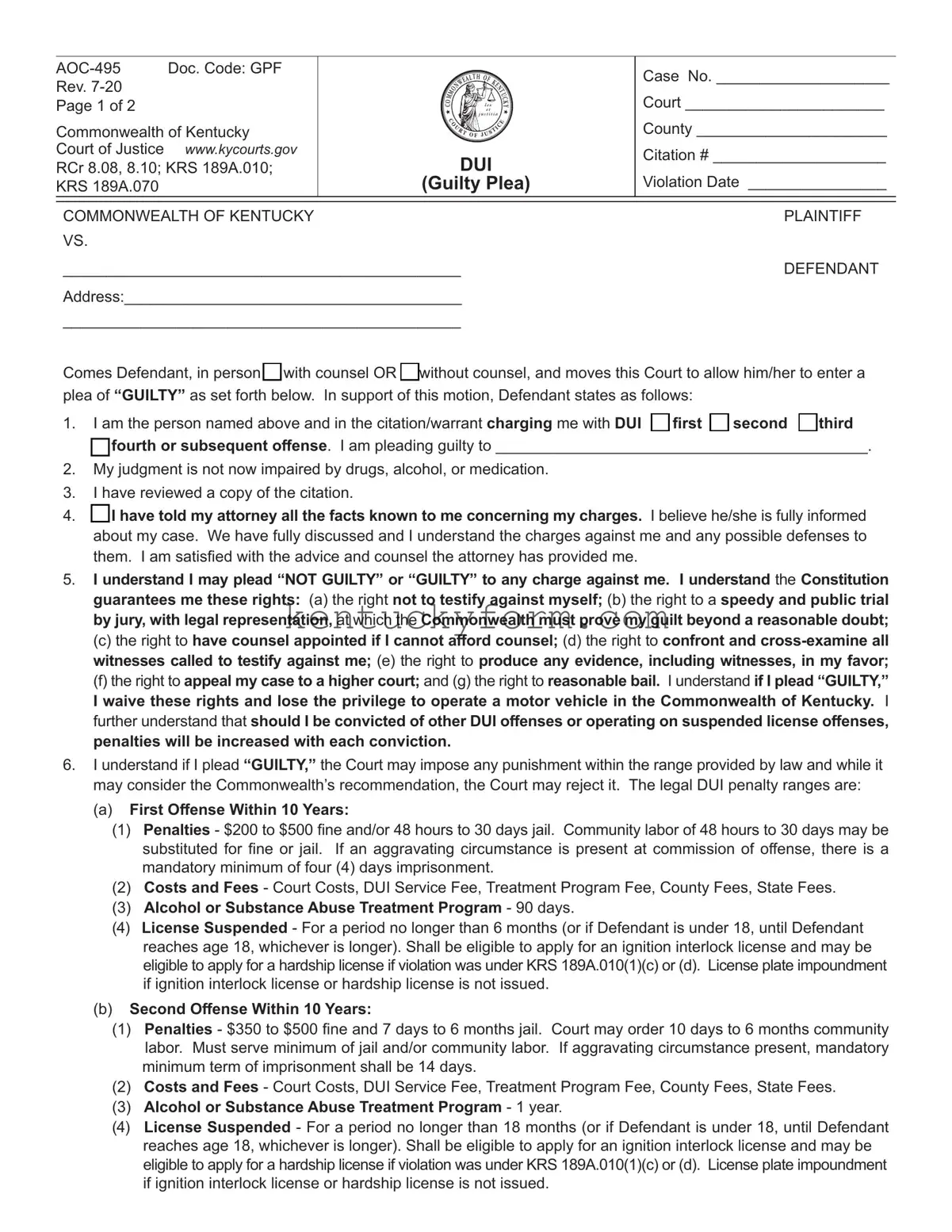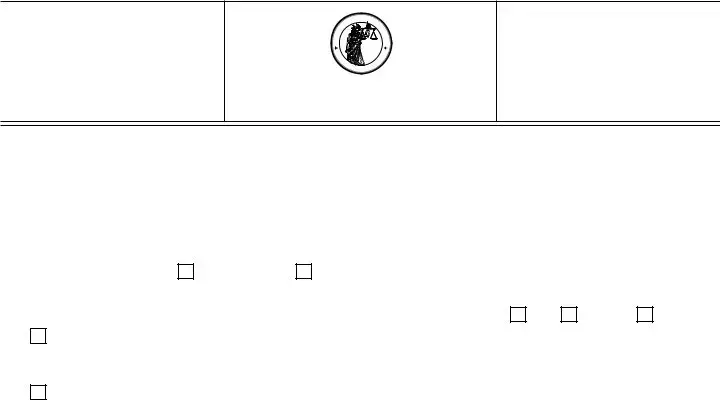AOC-495
Rev. 7-20
Page 2 of 2
(c) Third Offense Within 10 Years:
(1) Penalties - $500 to $1000 fine and 30 days to 12 months jail, and court may order 10 days to 12 months community labor. Must serve minimum of jail and/or community labor. If aggravating circumstance present, mandatory minimum term of imprisonment shall be 60 days.
(2) Costs and Fees - Court Costs, DUI Service Fee, Treatment Program Fee, County Fees, State Fees.
(3) Alcohol or Substance Abuse Treatment Program - 1 year.
(4) License Suspended - For a period no longer than 36 months (or if Defendant is under 18, until Defendant reaches age 18, whichever is longer). Shall be eligible to apply for an ignition interlock license and may be eligible to apply for a hardship license if violation was under KRS 189A.010(1)(c) or (d). License plate impoundment if ignition interlock license or hardship license is not issued.
(d) Fourth or Subsequent Offense Within 10 Years:
(1) Penalties - 1 to 5 years (Class D Felony). Must serve 120 days. If aggravating circumstance present, mandatory minimum term of imprisonment shall be 240 days.
(2) Costs and Fees - Court Costs, DUI Service Fee, Treatment Program Fee, County Fees, State Fees.
(3) Alcohol or Substance Abuse Treatment Program - 1 year.
(4) License Suspended - For a period no longer than 60 months (or if Defendant is under 18, until Defendant reaches age 18, whichever is longer). Shall be eligible to apply for an ignition interlock license and may be eligible to apply for a hardship license if violation was under KRS 189A.010(1)(c) or (d). License plate impoundment if ignition interlock license or hardship license is not issued.
(e) Aggravating Circumstances referred to above are: (1) Operating motor vehicle (MV) in excess of 30 miles per hour above the speed limit; (2) Operating MV in wrong direction on limited access highway; (3) Operating MV that causes accident resulting in death or serious physical injury; (4) Operating MV while alcohol concentration in operator’s blood or breath is 0.15 or more as measured by test(s) of a sample of the operator’s blood or breathtaken within 2 hours of cessation of operation of MV; (5) Refusing to submit to any test(s) [blood, breath, or urine] requested by offi cer having reasonable grounds to believe person was operating or in physical control of a MV in violation of KRS 189A.010(1), except for a fi rst off ense under KRS 189A.010(5)(a); and (6) Operating MV that is transporting a passenger under 12 years of age.
7.I understand that if the Court rejects the plea agreement, it must so inform me and allow me to either persist in my guilty plea, in which case I may receive a less favorable disposition of my case than is contemplated in the plea agreement, or withdraw my guilty plea and proceed to trial.
8.In return for my guilty plea, the Commonwealth has agreed to recommend to the Court the following original/amended
charge(s) and sentence(s):______________________________________________________________________
____________________________________________________________________________________________
Other than the recommendation, no one, including my attorney, has promised me any other benefit in return for my guilty plea, nor has anyone forced or threatened me to plead “GUILTY.”
9. Because I am guilty and make no claim of innocence, I wish to plead “GUILTY” in reliance on the above
recommendation. These facts establish my guilt: On ___________________________, 2_____,
____________________________________________________________________________________________
____________________________________________________________________________________________
OR
Pursuant to North Carolina v. Alford, 400 U.S. 25 (1970), I wish to plead “GUILTY” in reliance on the above recommendation. In so pleading, I do not admit guilt but I believe the evidence against me strongly indicates guilt and my interests are best served by a guilty plea.
10.I understand that because of my conviction here today, I may be subject to greater/enhanced penalties if found guilty and/or convicted of any future criminal offenses. I understand that if I am not a United States citizen, I may be subject to deportation pursuant to the laws and regulations governing the United States Immigration and Naturalization Service.
11.I declare my plea of “GUILTY” is freely, knowingly, intelligently and voluntarily made. I understand the nature of this proceeding, the complete terms of this plea, and all obligations imposed upon me by its terms.
Signed in open court this _______ day of ________________________________, 2______.
______________________________ ______________________________ ______________________________



